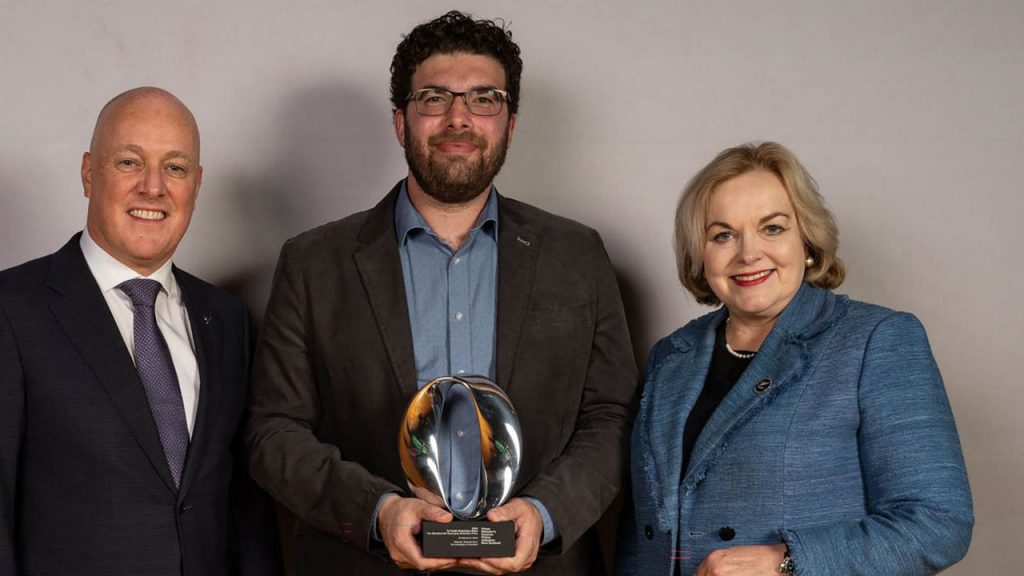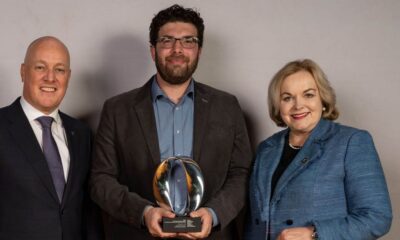Science
Cognitive Scientist Warns of Brain Drain Due to Science Funding Crisis

Cognitive scientist Samuel Mehr, who received New Zealand’s top science prize last year, has issued a stark warning about the future of the country’s scientific community. He claims that unless there is a significant overhaul of the current funding system, many of New Zealand’s brightest minds will leave for opportunities abroad. Mehr described the existing science funding as “laughably pathetic” and noted that recent cuts and restructures have only contributed to an environment that discourages innovation.
In a statement reflecting on the past decade, Mehr highlighted a troubling trend: New Zealand has lost its standing as a hub for innovation. He emphasized that this decline is not merely a matter of perception but a tangible reality affecting researchers and their work. The cognitive scientist pointed out that the funding reductions have served as “insult to injury,” exacerbating the challenges faced by the scientific community.
Concerns About Innovation and Investment
The implications of inadequate funding are profound. According to Mehr, many talented researchers are either leaving the country or considering doing so due to a lack of support and resources. This brain drain threatens the very foundation of New Zealand’s scientific advancement and could hinder future innovations that contribute to economic growth.
The criticism of the funding landscape is echoed by other prominent figures in the scientific community. Many argue that without a competitive funding model, New Zealand risks falling further behind its international peers. The government has faced increasing pressure to invest more substantially in science and technology, recognizing that these fields are crucial for the nation’s long-term prosperity.
Recent data indicates that research funding in New Zealand has not kept pace with the increasing costs of conducting high-quality scientific research. With inflation and rising operational expenses, many researchers are finding it difficult to sustain their projects. This environment creates an uphill battle for innovation and collaboration, leading to a stagnation in scientific progress.
Future Prospects for New Zealand Science
As the landscape continues to evolve, the urgency for reform becomes more apparent. Experts argue that without a revitalized funding system, New Zealand’s position as a leader in cognitive science and other research fields may be jeopardized. The call for change is not just about financial support; it is about fostering an ecosystem where scientists can thrive and collaborate effectively.
In response to Mehr’s comments, some government officials have acknowledged the need for improvements. Discussions are ongoing regarding potential increases in funding and new initiatives designed to attract and retain talent within the country. However, concrete measures have yet to be fully outlined, leaving many in the scientific community anxious about the future.
In conclusion, Samuel Mehr‘s candid assessment of New Zealand’s funding crisis underscores a critical juncture for the nation’s scientific future. As the country grapples with these challenges, the call for a robust and sustainable funding model becomes increasingly vital. Without decisive action, New Zealand risks losing its most talented researchers and the innovations that drive its economy forward.
-

 Sports2 months ago
Sports2 months agoNetball New Zealand Stands Down Dame Noeline Taurua for Series
-

 Entertainment2 months ago
Entertainment2 months agoTributes Pour In for Lachlan Rofe, Reality Star, Dead at 47
-

 Entertainment3 weeks ago
Entertainment3 weeks agoNew ‘Maverick’ Chaser Joins Beat the Chasers Season Finale
-

 Sports2 months ago
Sports2 months agoSilver Ferns Legend Laura Langman Criticizes Team’s Attitude
-

 Politics4 weeks ago
Politics4 weeks agoNetball NZ Calls for Respect Amid Dame Taurua’s Standoff
-

 Entertainment2 months ago
Entertainment2 months agoKhloe Kardashian Embraces Innovative Stem Cell Therapy in Mexico
-

 World3 months ago
World3 months agoPolice Arrest Multiple Individuals During Funeral for Zain Taikato-Fox
-

 Sports2 months ago
Sports2 months agoGaël Monfils Set to Defend ASB Classic Title in January 2026
-

 Entertainment1 month ago
Entertainment1 month agoTyson Fury’s Daughter Venezuela Gets Engaged at Birthday Bash
-

 Sports1 month ago
Sports1 month agoHeather McMahan Steps Down as Ryder Cup Host After Controversy
-

 World1 week ago
World1 week agoSevere Winds Hit New Zealand, Over 100 Flights Canceled
-

 Entertainment1 month ago
Entertainment1 month agoTyson Fury’s Daughter Venezuela Gets Engaged at Birthday Bash


















